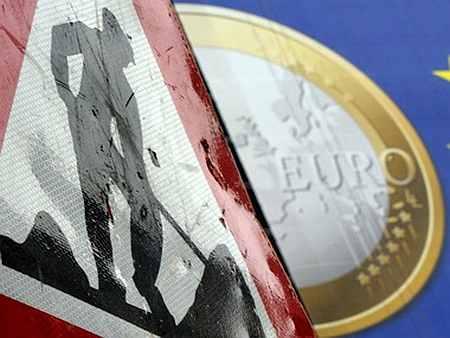
Ever since the European sovereign debt crisis first came into sharp focus in late 2009, talk about "the end of the euro" has been going on and off like a flickering light bulb in an abandoned mansion.
The euro itself fell nervously at first, till May 2010, when, as European finance ministers agreed on the European Financial Stability Facility (EFSF), it rallied strongly to reach a high of nearly $1.50 in April 2011. Since then, it has subsided to the 1.30 levels that prevailed when the crisis first started.
What is curious, however, is that during this period, the euro disconnected itself from its usual negative correlation with the dollar. This is quite readily seen if you compare the volatility of the price of gold denominated in euros with that of gold denominated in dollars.
...
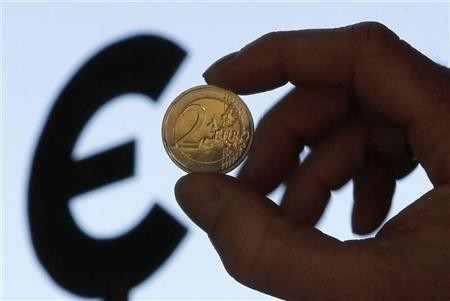
Since both gold and the euro generally show a negative correlation with the dollar -- rising when it falls, and vice versa -- the volatility of gold denominated in euros is usually a bit lower than the volatility of gold in dollars.
However, since May 2010, the volatility of gold in euros climbed above normal gold volatility, and stayed there till January this year. Clearly, the EFSF (and other rescue activities undertaken by the European ministers and the European Central Bank) took the euro out of its "normal" mode, reflecting the crisis-control situation.
With the euro now back to normal, at least from the dollar-correlation standpoint, the questions that beckon are:
(A) Is the euro (and Europe), in fact, back to normal? Or
(B) is it time for EFSF-Mark II? Or
(C) is the euro going to collapse and then trigger EFSF-Mark II? Or
(D) is this the beginning of the end?
...
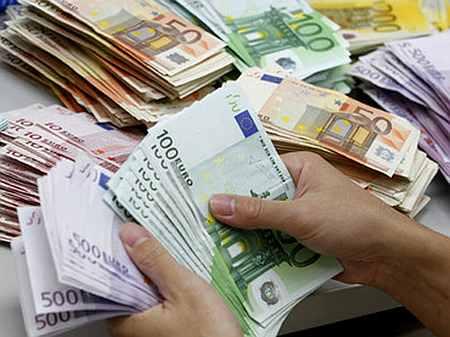
A, above, is definitely a non-starter, since it is more than clear that the problems in Europe are nowhere near over. Populist politicians are racking up gains all over the continent, and all of them, of course, want less austerity.
Confronting this are the facts: the 17 countries that use the euro spent (in 2009) over 30 per cent of gross domestic product (GDP), or $3.75 trillion, on social protections (not including subsidies).
That was more than $11,000 per capita. (In the same year, India spent a bit over $100 billion, or Rs 5 lakh crore, on social protections, including subsidies; that worked out to about 7.5 per cent of GDP, or around $89 per capita.)
What this means is that even if the euro countries were to cut their social protections by 10 per cent, it would take nearly 25 years for them to clear their government debt, which (in 2009) was over $8 trillion. Today, debt is over 90 per cent of GDP (compared with 70 per cent in 2009) and government bond yields are much higher.
...
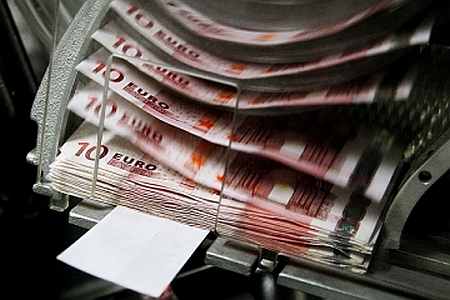
It's hard to believe that markets can accept this imbalance for much longer. Already, Standard & Poor's has downgraded Spain, and, although S&P downgrades these days are met with a mere shrug, in this context it certainly adds to the impending gloom.
With no clear consensus on the ground on the way forward, both within individual countries and in the euro zone as a whole, EFSF-Mark II (B), if it were to come, would, at best, be a palliative.
A sudden, sharp fall in the euro -- C -- looks increasingly possible, particularly since markets have been much too quiet recently. Despite the difficulties in Europe, not to mention the slowdown in China and other emerging markets, and the fact that Mr Bernanke is loud about his concerns on the US recovery, the VIX remains shockingly low, suggesting there is not too much risk in equity markets. Volatility in most other markets is also low and declining, and liquidity is sharply down across the board.
...
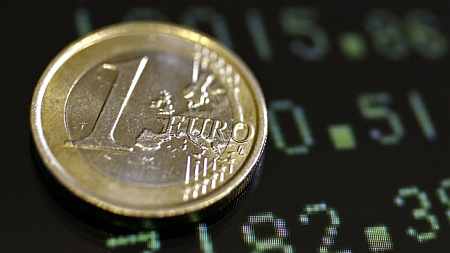
All this signals some sort of break-out -- perhaps, the long-anticipated dollar roar. However, there are very heavy short dollar positions in the retail space, which suggests that any dollar rally may be preceded by one last dump -- markets usually turn right after the little guys exit at a loss. In any event, volatility looks a pretty sure bet to rise.
The real denouement, though, points unflinchingly in the direction of D -- the demise of the euro. While many (including myself) have spoken of it, some since its birth in 1999, the idea of the end of the euro has always been abstract, and hence easy to talk about.
The Wolfson's Economics Prize for 2012 asked for ideas on the best way for economic growth to be managed if, indeed, one or more countries left the euro. The competition attracted some very interesting ideas, which, in detailing intricacies that would arise, make the prospect that much more real, and much more frightening.